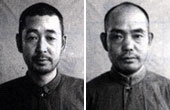Japan approves defense white paper for 2014
(Xinhua) Updated: 2014-08-05 14:11
|
 |
|
Japan's Defence Ministry's annual white paper is approved by the cabinet on August 5, 2014. [Photo/IC] |
TOKYO - The Japanese cabinet approved a defense white paper for 2014 on Tuesday and confirmed the country's overhaul on its defense status through summarizing policy changes after Prime Minister Shinzo Abe took office in late 2012.
The white paper, with more than 500 pages, has four parts, namely security environment surrounding Japan, Japan's security and defense policy, initiatives of defense of Japan and bases to demonstrate defense capabilities.
The white paper covers a series of defense policies since last December such as the national security strategy, the new National Defense Program Guidelines and a cabinet decision on exercising right to collective self-defense.
Japan needs to beef up its defense capacity and coordinate its defense ability with the Japan-US security treaty so as to cope with an increasingly severe security environment surrounding Japan, the document said, while pointing out that threats are coming from the Democratic People's Republic of Korea, China and Russia.
The Japanese government has recently provoked disputes on historical issues and made unprecedented dramatic changes to its security policy, Chinese Foreign Ministry spokesman Hong Lei told a recent daily press briefing.
"People cannot but question whether Japan will change the peaceful development path it has long stuck to since the end of World War II," Hong said at the press briefing last month.
"We oppose Japan's fabrication of the so-called China threat so as to serve its domestic political purposes," he said.
Compared with previous white papers on defense, the new version also highlighted Japan's cooperation and exchanges on defense with other countries and a proposal that Japan should play a dominant role in regional and international cooperation in the defense area.
Analysts here said that such contents of the white paper exposed the Abe administration's ambition to make Japan a military power in the region.
Meanwhile, the white paper fully inherited Abe's explanation that exercising collective defense does not run contrary to Japan' s war-renouncing constitution, calling the move "historic."
However, Japanese experts on legislation said the cabinet decision on collective defense has major legal defects and the majority of Japanese people oppose the decision.
A latest nationwide poll by Japan's Kyodo News said that 84.1 percent of respondents believe the government has yet to provide a sufficient explanation regarding the cabinet's decision, while 60. 2 percent of respondents said they oppose exercising the right to collective self-defense.
Japan released its first white paper on defense in 1970 and has been compiling new versions annually since 1976.
Related reading:










